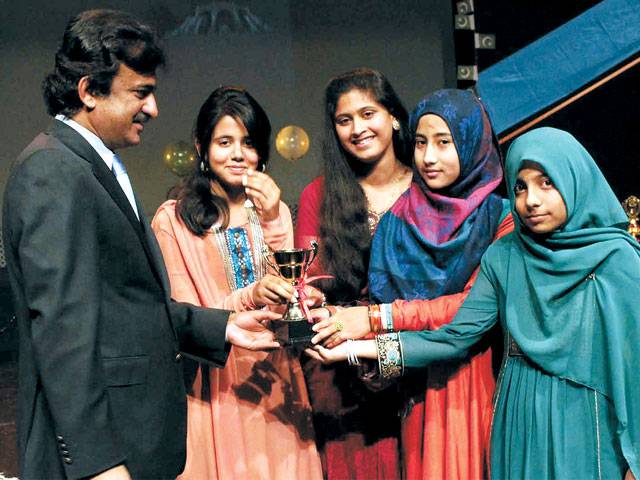ISLAMABAD - To pay tribute and highlight the true legacy of Urdu short story writer Saadat Hassan Manto, a play “Kaun Hai Yeh Gustakh” was staged at the PNCA here on Thursday.
The play was staged to mark his birth centenary and the occasion when the government has announced to confrere the highest civil award of the country Nishan-e-Imtiaz posthumously on Manto on March 23.
Though, it’s too late still the government has done the right thing to recognise his work, said the writer of the play, Shahid Nadeem. But there is need to adopt his philosophy of friendship and leave hypocrisy that is prevalent both at the individual and state levels.
‘It is generally believed that Manto wrote only about women and sensational things but it’s not true. He also had keen political observation. What Pakistan has become today, Manto predicted with great vision in his stories and essays years ago. So I tried to put up his letters, essays and stories together and added 20 percent of my efforts to give them a shape of play that recounts his every kind of work’ explained the writer.
The play focused on Manto’s life in Lahore after his migration to Pakistan in 1948 till his death in 1955. Manto was a mild-mannered person but he was indeed an impudent, ‘gustakh’ writer. He never minced words when it came to calling a spade a spade.
Manto broke taboos, tore through barriers and exposed ‘the nakedness of the king and society’. He in the process of detailing this descent into madness and its aftereffects ended up defending himself against many cases of obscenity leveled against him. He was banned, harassed and persecuted by the courts and the press and exploited by the publishers that left him heartbroken.
In the play Manto is visited by characters from his stories and essays that were used to narrate his literary and emotional journey. In his loneliness he is visited by a mysterious woman who wants him to write her story. Who are you, Manto asks him and she says that she is his inside woman who forces him to write stories of dejected women.
Writing about women is not easy, Manto explained in the play in conversation with writer and poet Ahmad Nadeem Qasmi. ‘For a man to write about women it’s inevitable to assume womanhood as without feeling a woman’s feeling anything written about her by a man would be superficial’.
He was strictly advised by the doctors to stay away from alcohol and he restrained himself but an incident of gang rape of a pregnant woman affected him to the extent that he again started drinking saying that death is better than this life of humiliation that caused his death at a young age of 42.
Poet Kishwar Naheed, former Lok Virsa Executive Director Aksi Mufti, writer and former Managing Director of Pakistan Television Agha Nasir, former Director General ISI Asad Durrani, students and people from various walks of life enjoyed the play and praised the beautifully written dialogues.
The play was staged by Ajoka Theater after two years at Pakistan National Council of Arts on Wednesday.
To pay homage to Faiz Ahmad Faiz on the World Poetry Day Thursday, another play was staged at PNCA by the theater group. The play ‘Rozan-e-Zindan Se’ is Ajoka’s tribute to the great poet and his wife on the occasion of Faiz centenary. It was based on extracts from the letters and related poems written by Faiz in prison to his wife.
The letters he wrote from prison to his wife Alys, throw light on Faiz, the devoted husband and the loving father. Written during 1951-55, they give a rare insight into his emotional state during imprisonment and his longing for his family, his city and his love for nature.
Equally significant and revealing are letters, which Alys wrote, while taking care of the two little girls, managing her job at the Pakistan Times, fighting like a tigress with the establishment.
Alys emerges as a dedicated wife and committed socialist and it seems that she must have had a significant influence on Faiz’s political consciousness.
These letters, which retain their romantic gloss in spite of being tainted by the censors they call it “public love-making” are also a testament of the times when the ruling elite of the newly-founded state of Pakistan were petrified of a communist take-over.
Saturday, April 20, 2024
Manto broke social taboos through writings

Pak economy improving, funds will be provided on request: IMF
9:57 PM | April 19, 2024
Minister advocates for IT growth with public-private collaboration
9:57 PM | April 19, 2024
Judges' letter: IHC seeks suggestions from all judges
9:55 PM | April 19, 2024
Formula 1 returns to China for Round 5
9:05 PM | April 19, 2024
Germany head coach Julian Nagelsmann extends contract till 2026 World Cup
9:00 PM | April 19, 2024
A Tense Neighbourhood
April 19, 2024
Dubai Underwater
April 19, 2024
X Debate Continues
April 19, 2024
Hepatitis Challenge
April 18, 2024
IMF Predictions
April 18, 2024
Kite tragedy
April 19, 2024
Discipline dilemma
April 19, 2024
Urgent plea
April 19, 2024
Justice denied
April 18, 2024
AI dilemmas unveiled
April 18, 2024
ePaper - Nawaiwaqt
Advertisement
Nawaiwaqt Group | Copyright © 2024





